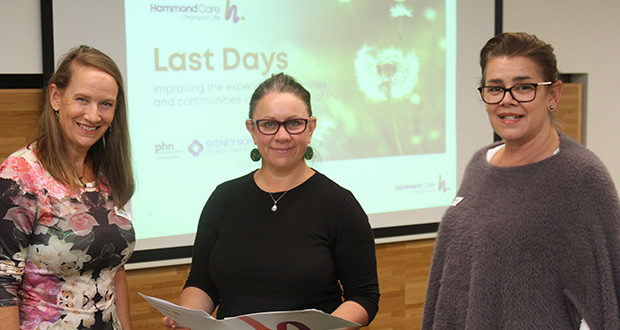An aged care provider has spearheaded a palliative care program to raise the sector's awareness and increase support for family members.
Not-for-profit organisation HammondCare has been trialling 'The Last Days' program over the past year and will officially launch the course in Northern Sydney next month.
The Australian-first course is aimed to equip family members and friends with practical skills and knowledge to cope with their loved one's passing.
"There is a need to help those who care for people at the end of life to prepare them through their journey," HammondCare general manager, Andrew Montague, said.
"Especially in aged care, there should be more information available for people seeking palliative care and how family members can support them.
"If we can do something to educate people, so they have greater understanding, it'll help them through a challenging time in their lives."
It's estimated that 4,500 people in residential homes needed palliative care in 2021, of which half passed away within eight weeks of accessing the service.
Nearly 60 per cent of those receiving end-of-life support were over 85.
Early access to palliative services in aged care has been shown to result in better outcomes, where older people have fewer symptoms and a higher quality of life.
It also lowers the number of hospitalisations and reduces stress for the patient, family members and friends.
Montague said that with an ageing population and higher life expectancy of people over 85, there's an urgent need to improve palliative services in aged care.
"Good palliative care is a partnership between the person, health professionals, families and carers to maximise the quality of life," he said.
"We need to promote better care planning, facilitating end-of-life conversations and managing symptoms for people in aged care."
The program focuses on enabling early communication and decision-making about end-of-life preferences.
It aims to provide families and carers with a better understanding of what they can expect during the dying process and how they should manage symptoms.
They'll also offer resources after the program to support people in coping with grief after death.
Montague said the program is an open space to talk about anything before, during, and after the dying process of a loved one.
"We talk about general questions people might have but also go into deeper conversations that might be harder to answer or find," he said.
"For example, how do you actually talk to your loved one? And how do you talk about it with your family members?
"We also have a specific topic on dementia because there are subtle differences in what someone might see when their loved one is at their end of life with this disease."
Earlier this week, federal data revealed that dementia had become older Australians' number one disease burden.
It estimated that, collectively, people lost nearly 230,000 years of healthy life to dementia in 2020, an increase of 61 per cent in overall impact since 2011.
Montague said we should prepare the aged care sector for the rising number of dementia cases, including providing better palliative care for people with the disease.
"Our whole aim is to ensure that people have the best possible death they can," he said.
"But also families and friends who will experience a lot of grief and bereavement that can significantly impact their relationship with family members."
Clinical nurse and palliative care specialist at HammondCare, Rachael Zielinski, was highly involved in the development of the program.
"Death and dying is the elephant in the room – and one of the last taboos," she said.
"We hope the program will provide a place to reflect and discuss death and dying, breaking down notions that preparing for the end of life is technical, private and hidden.
"It will also seek to encourage more openness in making and documenting end-of-life choices."
HammondCare is looking to partner up with other aged care providers and health organisations to improve and expand the course delivery.
Do you have an idea for a story?Email [email protected]
 Aged Care Insite Australia's number one aged care news source
Aged Care Insite Australia's number one aged care news source

